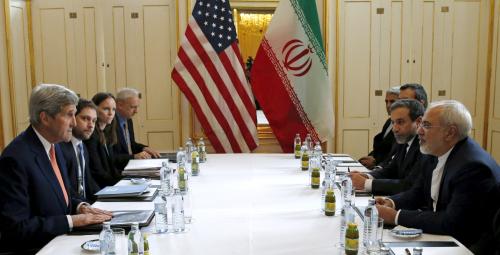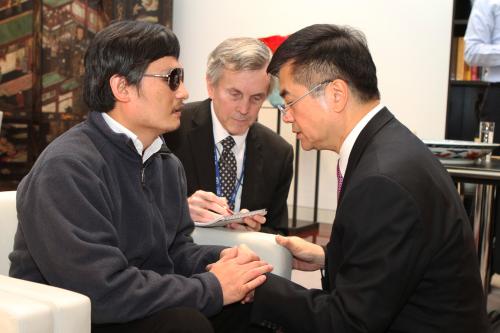Roberta Cohen joined Jayshree Bajoria to discuss human rights, North Korea, and what the U.S. should do to include human rights in its policy toward North Korea.
The U.S. government’s policies toward North Korea in recent years have drawn criticism for focusing primarily on denuclearization, while neglecting human rights issues, even as the country’s human rights situation remains dire. Roberta Cohen, a human rights specialist at the Brookings Institution, who is on the board of the independent Committee for Human Rights in North Korea, says arguments against including human rights in discussions with North Korea are flawed. She recommends integrating human rights as part of an overall U.S. policy toward North Korea. She also calls for the development of a multilateral security mechanism for Northeast Asia fashioned on the Helsinki model that promoted linkages among economic, energy, and human rights issues in negotiations between Western Europe and former Eastern Bloc countries during the early 1970s.
Jayshree Bajoria: Why do you think human rights issues have not been on the table in Washington’s negotiations with the North Korean regime?
Roberta Cohen: The main argument against including human rights in any discussion has been that this would detract from the nuclear issue and that issue is too critical. A regime like North Korea with nuclear weapons and proliferation capabilities is a danger to Northeast Asia and the world. It’s also been argued that raising human rights will necessarily lead to confrontations, and North Korea in any event is impervious to criticism. These arguments, however, are quite faulty. The Carter and Reagan administrations did not give up on human rights goals in negotiating arms control agreements with the Soviet Union. With North Korea there can also be very vigorous and professional diplomacy that’s focused, to begin with, on questions of access and family reunifications, free flow of information, vulnerable groups—children, disabled people, elderly people—and then they can breach out into more traditional human rights issues.
Furthermore, North Korea is not entirely impervious to outside opinion. It has ratified five human rights treaties and it has provided some reports to the United Nations on its compliance. It has taken a few steps, albeit quite minimal, to bring some laws into compliance with international standards. It did reform some of its criminal code and signed the North-South Basic Agreement in 1992 with South Korea, which agreed to family visits, to increased travel, and to freer correspondence. There also has been enlarged access in the past for relief workers to bring in food and they accepted wider monitoring in accordance with World Food Program standards. The arguments made for excluding human rights from the discussion really should be reconsidered.
Bajoria: Has this also been the result of discrepancies between different U.S. government departments and in their policy priorities when dealing with North Korea?
Cohen: There hasn’t been a coherent U.S. policy on human rights in North Korea. There were, for example, in the Bush administration a lot of disputes between the State Department and the Congress and within the State Department over the extent to which human rights should be integrated in foreign policy with North Korea. So, what really needs to happen is the development of a coherent policy where human rights are part of overall U.S. policies and programs toward North Korea and the policy is one that the entire government stands behind—the White House, the National Security Council, all the offices of the State Department, as well as the Congress.
Bajoria: For years now, Washington has tried multilateral forums such as the Six-Party Talks, aimed at denuclearizing North Korea, which have shown few results. Now that Pyongyang has walked away from the Six-Party Talks, is there a way human rights could take the forefront in U.S. dealings with North Korea?
Cohen: Right now there are no discussions. However, dialogue and negotiations will undoubtedly resume with North Korea. Part of it will come about, I would think, as the succession process in North Korea develops as they transform into a new government that will help in leading to a renewed dialogue and negotiations. Right now is a time one has to plan and prepare for discussions. The United States during this time should develop a coherent policy, one that’s supported by the entire government, and the policy should focus on practical and achievable results, with long-term and more immediate goals.
A long-term goal could be dismantling of the penal labor camps where more than one hundred thousand people are held in brutal conditions, or the development of a more democratic open society. But more immediate goals have to focus on gaining access for international UN human rights monitors, for the International Committee of the Red Cross [ICRC] to prisoners, and for the UN High Commissioner for Refugees, to promote exchanges of different scientific, journalistic, and cultural visits.
Bajoria: What do you think are achievable results?
Cohen: There are issues such as family reunification that might be possible because North Korea has agreed to them in the past, [as well as] a greater ICRC role, [and] the liberation of children from the camps. It can be argued that this does not pose a danger to the state. The United States can develop high-interest cases of prisoners that it would then begin to raise with the North Koreans. Achieving these goals can also begin to be done multilaterally. It would be important for the United States to mobilize a group of governments to work with to try to promote greater access. There are European countries, for example, that have had dialogue with North Korea on human rights, that have held training sessions with them.
At the United Nations, there are many ways to try to accomplish this. There are many different UN bodies that deal in one way or another with human rights in North Korea. However, there hasn’t been to date any overall strategy coming from the UN Secretary General’s office for carrying out all the different human rights recommendations, as well as expanding the role of the UN High Commissioner for Refugees, the World Food Program, making approaches for the International Labor Organization, and then coordinating all of these so there can be impact in North Korea. It would be important, therefore, for the United States to try to promote, with the Secretary General and a group of states, some kind of coherent strategy that would actually begin to try to [address] … human rights goals in North Korea. The United States then must also begin to integrate human rights in North Korea in its dialogues with China, which has more leverage and influence on North Korea than any other country.
Bajoria: Beijing is accused of violating international laws by forcibly repatriating North Korean refugees, many of whom are persecuted on return. Traditionally, China has been quite reluctant to speak out on human rights issues inside any other country. How then do you think the United States could work with China?
Cohen: At the United Nations, China has supported human rights actions in a number of countries. When they initially entered the United Nations they had this very hard and fast noninterference in internal affairs [policy] that has undergone quite a bit of change over the last decade. And so they do support UN actions that try to gain access to different countries. Now, when it comes to North Korea, it would be important for the United States to begin to convene discussions that are not only bilateral but multilateral with China, because the North Koreans who seek refuge in China also go to other countries, and they ultimately may want to go to South Korea. There are various other countries involved in this exodus. And it would be useful to have discussions that lead to rejection of any forcible returns to North Korea to conditions of danger, but that also creates a system of screening and resettling North Korean refugees in other countries, in particular South Korea and also in the United States. This is a multilateral issue whereas different governments can be involved in working this out and in trying to develop a more positive approach to the subject. China may have some interest in that they bear the brunt of North Korea’s failed policies. They’re the ones that are the main recipients of the refugees. So there may be interest on the part of China in working in a multilateral group to create a better system for those coming out of North Korea.
Bajoria: You have written about developing a Northeast Asian security forum where human rights issues in North Korea could be addressed. You have also advocated for a Helsinki-style model, the process of negotiations between Western Europe and the former Easter Bloc countries in the early 1970s. Could you talk a little bit about this framework and how this would actually work?
Cohen: It should be pointed out that the Six-Party Talks initially seemed to be leading to discussions about the development of a multilateral security mechanism for Northeast Asia, because it is considered something that could bring greater peace and security to the whole area. Now, in looking at the peace and security framework that was set up in East and Western [Europe], one can see that the discussions and the relationships focused on a much broader range of issues—peace and security, economic issues, energy issues, what are called ‘human dimension issues,’ as well as human rights concerns. So the Helsinki model of discussions and review meetings became a perfect vehicle for promoting human security or human dimension issues. Now, in the case of North Korea, it would seem to me a very fine vehicle for bringing in human rights and humanitarian issues at th same time as economics and security and energy, so that North Korea and other governments might find benefits in being part of this process while at the same time accepting and examining their international human rights obligations. It’s a long-term goal. It’s one that could be very important in the human rights area, not just for reviewing human rights issues but for improving cooperation in humanitarian emergencies, which North Korea and China might support.
Read the full interview » (external link)


Commentary
Raising Human Rights with North Korea
July 23, 2009